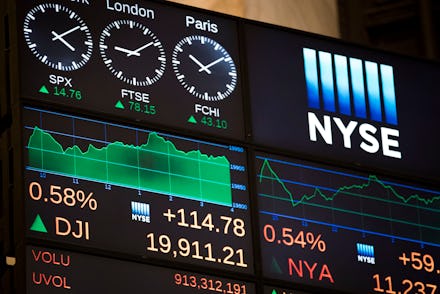The DJIA hits 20,000: Here's why everyone's talking about the new stock market record high

The financial world is freaking out right now because the Dow Jones Industrial Average just hit 20,000 points.
First: It's worth noting that people have been expecting this milestone for a while. The Dow can be a tease sometimes, in that way.
Of course, not everyone is getting in on the party, and think that the hype is all for nothing. The investor and financial writer Douglas Kass recently called the obsession over the 20,000 figure "asinine."
So why all the fanfare?
On one hand, it's a big round number, although there's a little more to it than that. The DJIA is seen as a major bellwether for the economy, because the index includes a lot of the country's largest companies like McDonalds, General Electric and IBM.
There's also no doubting that market has been on something of a tear lately. The index first topped 19,000 very recently, on Nov. 22, making the past month-or-so the second fastest 1,000 point run in the Dow's history.
On the other hand, there are plenty of contrarians. For one, the Dow only contains 30 companies — a fairly small snapshot if you think about it, and many of the stocks within are considered predictable and "boring."
People also argue that because the Dow weighs stocks with a high share price more heavily, it's less representative of the broader market than more modern peers like the S&P 500, which contains 500 stocks.
After all, a stock's share price is a relatively meaningless number without also taking into account the number of outstanding shares. That'd be not unlike pricing a house without knowing the square footage.
That quirk is part of why Goldman Sachs, which fetches $235 a share as of Wednesday morning, at one point accounted for a quarter of the Dow's post election gains, despite being one of only 30 companies.
A reason you actually should care?
Some market watchers are worried that stocks are getting too expensive, and that the post-election gains have come too fast: What goes up must come down, as they say.
It was Warren Buffett who once said investors should be "fearful when others are greedy and greedy when others are fearful."
There is some data to support that notion. While all stocks are priced by the market, meaning that they're worth whatever someone's willing to pay for them, there are other stock metrics that are more concrete. How much money the company made last quarter, for instance.
When stocks are referred to as being "expensive," what that means is that the share price is higher than what you might expect given the company's profits, earnings, or whatever. There are lots of schools of thought about which of these numbers is most important.
There is one number though, which is starting to look like it's in the danger zone.
It's called the cyclically adjusted price to earnings ratio (CAPE), developed by the economist Robert Shiller.
Right now, the CAPE is around 28, a height that it has only reached a few other times: Before the 1929 stock market crash, the 2000 internet bubble crash, and the 2007 housing market crash.
That's got some people antsy, and the risks don't end there.
Other skeptics argue that the market is pricing in enthusiasm over some of President Donald Trump's policies, like business tax breaks, while ignoring some potential risks, like the increased possibility of a trade war.
Oh, and nuclear war.
Sign up for The Payoff — your weekly crash course on how to live your best financial life.